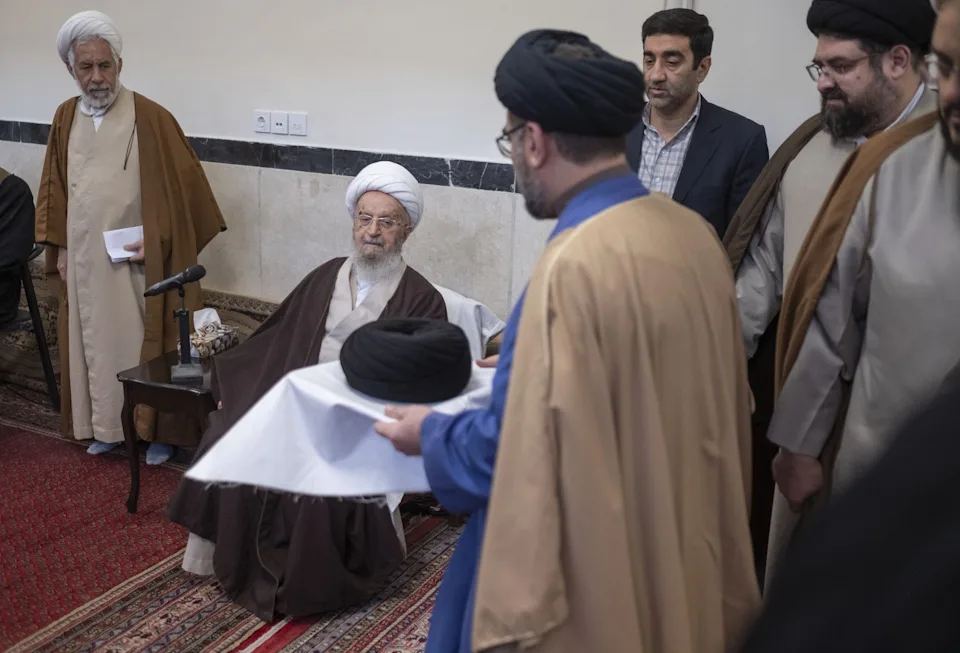Iranian Religious Leader Issues Fatwa Hinting at Death Sentence for President Donald Trump and Prime Minister Netanyahu
Iran's top Shia religious authority, Grand Ayatollah Naser Makarem Shirazi, issued a religious fatwa on Sunday targeting U.S. President Donald Trump and Israeli Prime Minister Benjamin Netanyahu
Iranian Religious Leader Issues Fatwa Hinting at Death Sentence for President Donald Trump and Prime Minister Netanyahu
Iranian Religious Leader Issues Fatwa Hinting at Death Sentence for President Donald Trump and Prime Minister Netanyahu
[Tehran, June 30, 2025] —
Iran's top Shia religious authority, Grand Ayatollah Naser Makarem Shirazi, issued a religious fatwa on Sunday targeting U.S. President Donald Trump and Israeli Prime Minister Benjamin Netanyahu. According to the New York Sun, several international experts are interpreting this fatwa as tantamount to incitement to global terrorism.
In the fatwa, Grand Ayatollah Shirazi declared that any individual or government posing a threat to the leadership and unity of the global Islamic Ummah shall be deemed a "mohareb" — an enemy combatant in Islamic law. In Islamic context, a mohareb is someone considered to be at war with God. Under Iranian law, punishment for mohareb can include death, crucifixion, amputation, or exile.
Shirazi stated, “Those who endanger the leadership and unity of the Islamic Ummah are war mongers.” He concluded his fatwa with a prayer asking God for protection from these “enemies,” and called for the swift return of the Mahdi — the awaited Imam in Shia belief.
The fatwa has drawn sharp criticism from British-Iranian analyst Niyak Ghorbani. Writing on X (formerly Twitter), he said, “This fatwa proves that the Islamic Republic's aggression is not limited to its own people — rather, it is preparing to export violence worldwide under religious pretense.” He warned, “The West must recognize that the Islamic Republic seeks to spread violence globally in the name of religion.”
The fatwa comes at a volatile time, just after the end of the so-called “12-Day War,” during which the United States and Israel conducted major strikes on Iran’s nuclear facilities. On June 13, Israel launched airstrikes against several Iranian nuclear and military sites, allegedly killing top scientists and military commanders. In retaliation, Iran fired ballistic missiles at multiple Israeli cities. The following week, the U.S. also entered the conflict, launching attacks on three nuclear facilities in Iran.
President Trump had previously warned that if Iran continued enriching uranium to weapons-grade levels, the U.S. would take more severe action. That warning was issued after a brief ceasefire, which ultimately collapsed into the 12-day escalation.
Iranian religious leaders have a history of issuing violent fatwas. The most infamous example is the 1989 fatwa by Iran’s Supreme Leader Ayatollah Khomeini against author Salman Rushdie, declaring a death sentence over his book The Satanic Verses, deemed blasphemous by the regime.
As a result of that fatwa, Rushdie spent many years in hiding; his Japanese translator was murdered, and several publishers of the book were attacked. Though he survived multiple assassination attempts, in 2023, Rushdie was stabbed at a public event in New York, resulting in the loss of one of his eyes.










